
Wessex was an Anglo-Saxon kingdom in the south of Great Britain, from 519 until England was unified by Æthelstan in 927.
A remake is a film, television series, video game, or similar form of entertainment, that is based upon and retells the story of an earlier production in the same medium—e.g., a "new version of an existing film". A remake tells the same story as the original but uses a different cast, and may alter the theme or change the story's setting. A similar but not synonymous term is reimagining, which indicates a greater discrepancy between, for example, a movie and the movie it is based on.

Rear Window is a 1954 American mystery thriller film directed by Alfred Hitchcock and written by John Michael Hayes based on Cornell Woolrich's 1942 short story "It Had to Be Murder". Originally released by Paramount Pictures, the film stars James Stewart, Grace Kelly, Wendell Corey, Thelma Ritter, and Raymond Burr. It was screened at the 1954 Venice Film Festival.
The family saga is a genre of literature which chronicles the lives and doings of a family or a number of related or interconnected families over a period of time. In novels with a serious intent, this is often a thematic device used to portray particular historical events, changes of social circumstances, or the ebb and flow of fortunes from a multitude of perspectives.

Bernard Cornwell is an English-American author of historical novels and a history of the Waterloo Campaign. He is best known for his novels about Napoleonic Wars rifleman Richard Sharpe. He has also written the Saxon / Last Kingdom stories about King Alfred and the making of England.
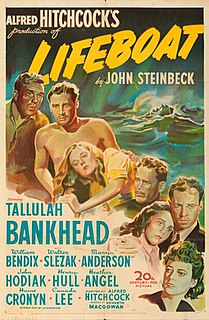
Lifeboat is a 1944 American survival film directed by Alfred Hitchcock from a story by John Steinbeck. It stars Tallulah Bankhead and William Bendix, alongside Walter Slezak, Mary Anderson, John Hodiak, Henry Hull, Heather Angel, Hume Cronyn and Canada Lee. The film is set entirely on a lifeboat launched from a passenger vessel torpedoed and sunk by a Nazi U-boat.
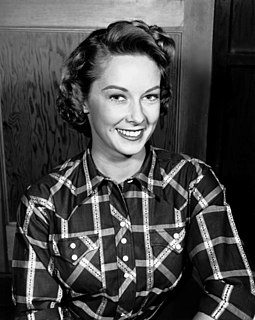
Vera June Miles is an American retired actress who worked closely with Alfred Hitchcock, most notably as Lila Crane in the classic 1960 film Psycho, reprising the role in the 1983 sequel Psycho II. Other films in which she appeared include Tarzan's Hidden Jungle (1955), The Searchers (1956), Alfred Hitchcock's The Wrong Man (1956), A Touch of Larceny (1959), The Man Who Shot Liberty Valance (1962), Follow Me, Boys! (1966), Sergeant Ryker (1968), and Molly and Lawless John (1972).

Terence Fisher was a British film director best known for his work for Hammer Films.

Alfred Kennerley was an Australian politician and Premier of Tasmania from 4 August 1873 until 20 July 1876.
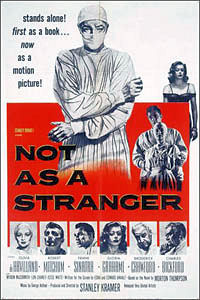
Not as a Stranger is a 1955 American film noir drama film produced and directed by Stanley Kramer, starring Olivia de Havilland, Robert Mitchum and Frank Sinatra. It is based on the 1954 novel of the same name by Morton Thompson, which topped that year's list of bestselling novels in the United States. The film's supporting cast features Gloria Grahame, Broderick Crawford, Charles Bickford, Lon Chaney Jr., Lee Marvin, Harry Morgan and Mae Clarke.

National Treasure: Book of Secrets is a 2007 American action-adventure film directed by Jon Turteltaub and produced by Jerry Bruckheimer. It is a sequel to the 2004 film National Treasure and is the second film of the National Treasure franchise. The film stars Nicolas Cage, Diane Kruger, Justin Bartha, Jon Voight, Harvey Keitel, Ed Harris, Bruce Greenwood, and Helen Mirren.
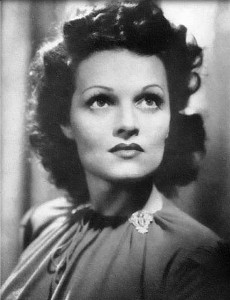
Florence Lindon-Travers, known professionally as Linden Travers, was a British actress.
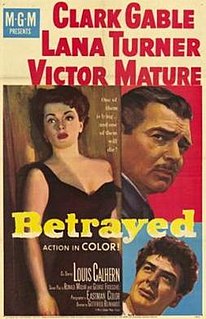
Betrayed is a 1954 American Eastmancolor war drama film directed by Gottfried Reinhardt and starring Clark Gable, Lana Turner, Victor Mature, and Louis Calhern. The screenplay was by Ronald Millar and George Froeschel. The musical score was by Walter Goehr and Bronislau Kaper, and the cinematography by Freddie Young. The picture, Gable's last for Metro-Goldwyn-Mayer, was filmed on location in the Netherlands and England, and was based on the story of turncoat Dutch resistance leader Christiaan Lindemans, also known as "King Kong". The supporting cast features O. E. Hasse, Wilfrid Hyde-White, Ian Carmichael, Niall MacGinnis, and Theodore Bikel. Betrayed was the fourth and final movie in which Gable played opposite Turner, and their third pairing set during World War II.

Knights of the Round Table is a 1953 British adventure historical film made by MGM in England and Ireland. Directed by Richard Thorpe and produced by Pandro S. Berman, it was the first film in CinemaScope made by the studio. The screenplay was by Talbot Jennings, Jan Lustig and Noel Langley from Sir Thomas Malory's Le Morte d'Arthur, first published in 1485 by William Caxton.

What a Carve Up! is a satirical novel by Jonathan Coe, published in the UK by Viking Press in April 1994. It was published in the United States by Alfred A Knopf in January 1995 under the title The Winshaw Legacy: or, What a Carve Up!

23 Paces to Baker Street is a 1956 American DeLuxe Color mystery thriller film directed by Henry Hathaway. It was released by 20th Century Fox and filmed in Cinemascope on location in London. The screenplay by Nigel Balchin was based on the 1938 novel Warrant for X, original UK title The Nursemaid Who Disappeared by Philip MacDonald. The film focuses on Philip Hannon, a blind playwright who overhears a partial conversation he believes is related to the planning of a kidnapping. When the authorities fail to take action because they believe his story is the product of a writer's fertile imagination, Hannon searches for the child with the help of his butler and ex-fiancée, using his acute sense of hearing to gather evidence and serve as guidance. The plot of the film bears some resemblance to Alfred Hitchcock's Rear Window of 1954, which also features a disabled protagonist witnessing a crime, which the police refuse to take seriously, therefore placing him in danger and culminating in a final standoff with the killer in the protagonist's darkened apartment.

Master of Bankdam is a 1947 British historical film directed by Walter Forde and based on the 1940 novel The Crowthers of Bankdam by Thomas Armstrong. It stars Anne Crawford, Dennis Price, Tom Walls, Stephen Murray, Linden Travers and David Tomlinson. The story concerns two generations of brothers who struggle for control of the family business in 19th century Yorkshire.
Thomas Armstrong was a Leeds-born novelist. He is best known for a series of popular novels set in Yorkshire, including the best-selling The Crowthers of Bankdam.
John Edward Crowther Ltd is a British textile and real estate company headquartered in Marsden, West Yorkshire, and incorporated in the United Kingdom. It was historically an important producer of woollen cloth in Marsden, West Yorkshire, England. Its premises at Bank Bottom Mill reached its heyday in the late nineteenth and early twentieth centuries under the ownership of the Crowther family, in particular John Edward Crowther, a businessman and philanthropist. However, the cloth industry declined in the late twentieth century, and production of woollen cloth finally ceased in 2003.
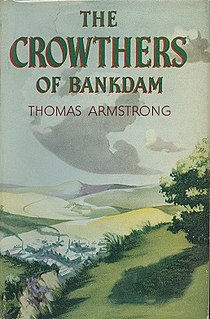
The Crowthers of Bankdam is a 1940 historical novel by the British writer Thomas Armstrong. His debut novel, it is a family saga following the fortunes of the Crowther family of Yorkshire mill owners across several generations from 1854. A popular success, it was followed by three sequels collectively known as the Crowther Chronicles
















